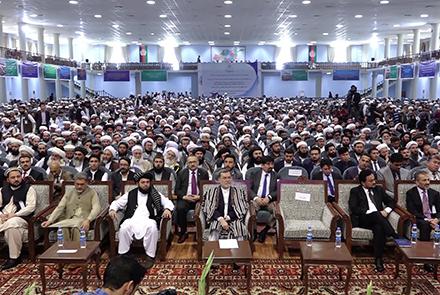Religious scholars from many Muslim countries gathered at an international symposium on Imam-e-Azam (the great imam) Abu Hanifa in Kabul on Wednesday where they condemned terrorism and extremism in all its forms and manifestation.
Second Vice President Mohammad Sarwar Danish inaugurated the three-day symposium that would see notable religious figures from Afghanistan, Turkey, Egypt, Central Asia and a number of other Muslim countries deliberating on various aspects of the life and teachings of the founder of Hanafi school of Sunni jurisprudence.
Besides information on the teachings the life of Abu Hanifa, the speakers talked about the much-debated topics of the day in the country, including peace and the existence of the threat of terrorism.
Danish said the teachings of Abu Hanifa encouraged Muslims to adapt and evolve in line with time. He said the Taliban should explain their denial of peace if they claim to be the followers of Abu Hanifa.
“The Afghan government as part of a goodwill gesture has used all options for creating a trust environment, but it is the opponents who are not prepared to engage even in direct talks,” said Danish.
Speaking on the occasion, a number of religious figures said that Abu Hanifa’s ideology and teachings could be a paradigm of fighting terrorism and extremism.
“In my perception, democracy has evolved to its full extent, but it has not reached to the extent that Abu Hanif wanted,” said Abdul Sattar Abdul Jabbar Abbas Al-Rabaee, Imam of Abu Hanifa Mosque in Kabul.
“Napoleon was feeling proud of his law, but Imam Abu Hanifa was one of the prominent scholars of Islamic law and he has got fame from Iraq to Syria, from Saudi Arabia to Egypt,” said Abdul Sattar Al-Jabili, an Egyptian scholar.
Imam Abū Ḥanīfa was an 8th-century Sunni Muslim theologian and jurist of Persian origin, who became the eponymous founder of the Hanafi school of Sunni jurisprudence, which has remained the most widely practiced law school in the Sunni tradition.

